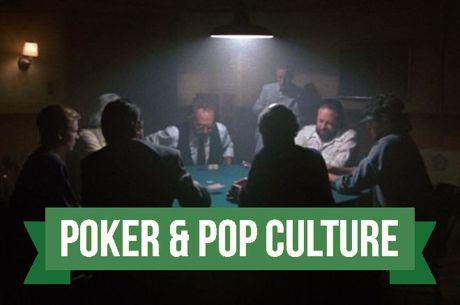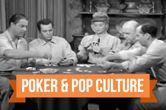Poker & Pop Culture: Card Games Help Reveal Characters in TV Comedies
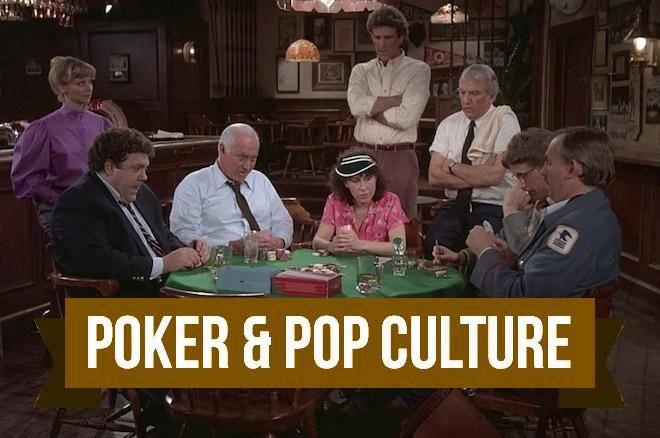
Last week we discussed some early situation comedies from the 1950s and 1960s that used poker as a source for ready-made conflicts and plots. Shows like I Love Lucy, The Honeymooners, and The Adventures of Ozzie and Harriet also used the male-dominated game of poker as a context of sorts to reinforce traditional ideas regarding general roles �� not unlike most television shows of the era.
Moving ahead a bit chronologically, there's another point worth making about the use of poker on sitcoms, one that sheds light both on the game and how such TV shows are often constructed.
As many painters, poets, fiction writers, radio programmers, filmmakers, playwrights, and others had discovered previously, poker provides sitcom creators a ready means to present characters to their audiences. As anyone who has played the game with strangers well knows, it sometimes can take just a single hand for people to "introduce" themselves (so to speak) �� if not formally, by their words and actions.
Since poker is a "social game" that generally requires individuals to interact with one another, it usually cannot be played very long before players begin to reveal something about themselves to each other, with their playing styles often mirroring their personalities.
As Anthony Holden (whom we've quoted before) once wrote, "Whether he likes it or not, a man's character is stripped bare at the poker table." And as David Mamet said (whom we've also quoted), "Poker reveals to the frank observer something else of import �� it will teach him about his own nature." Put characters around a poker table and it doesn't take long for them to become familiar to those watching.
Regarding sitcoms, many have observed the "formula" or "code" many of these shows tend to follow. Most feature episodes with a main plot plus one or two subplots. Most also introduce some sort of conflict, often early on, that necessarily gets resolved by the end of the show. A poker game is obviously a great way to introduce conflict into the proceedings, and usually in the light-hearted way sitcoms require.
Importantly, recurring characters tend not to change or develop very much from show to show, which means by the time the credits roll everyone is more or less right back where they began (useful for later syndication when the shows are often viewed out of sequence).
In a way, traditional TV sitcom series �� that is, those made before the phenomenon of online viewing and "binge" watching �� are like weekly poker games featuring the same players over and again, with no one winning or losing too much and everyone always able to "stay in the game," so to speak.
The poker episode of I Love Lucy discussed last week was only the second one in the series, appearing when audiences were just getting to know Lucy and Ricky Ricardo. That's actually typical of these poker-themed sitcom episodes �� many appear relatively early in the series, with the shows often helping introduce and distinguish characters by highlighting certain traits and features for them in the setting of a poker game.
In fact, of the popular shows I'll be discussing both this week and next �� all of which ran at least six seasons �� each of these poker episodes appeared during either the first or second season.
Sanford and Son shows how to "deal unto others as they have dealt unto you"
Sanford and Son, one of the most popular sitcoms on television during the 1970s, starred comedian Redd Foxx as a widower junk dealer named Fred Sanford who manages his business with the help of his son Lamont, played by Demond Wilson.
A 1972 episode from early in the second season titled "The Card Sharps" not only helped further flesh out the characters and their relationship, but also provided some backstory for the family.
Like many episodes, it begins with Fred slacking off (in this case sleeping), Lamont coming home, then Fred pretending like he was hard at work. ?
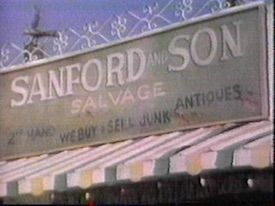
Lamont explains he has plans that night to have a group over for a poker game, and Fred objects. "Not in my house," says Fred. "You know what your mother called cards? Fifty-two devils in Satan's army!"??
Fred goes on to explain to Lamont how his mother made him swear off cards before she died. Lamont isn't deterred, however, pointing out how the only reason his mother made Fred promise not to play was because he was terrible and always lost.??
Lamont explains that he's played once before with the guys coming over, including one named Skeeter who apparently just got out of jail. "How much did you win?" asks Fred. "How did you know I won?" asks Lamont. Fred goes on to explain how "it's the oldest trick in the business," that is, to let a sucker win once, then the next time "break him�� take everything they got."??
Fred immediately warns Lamont not to play with Skeeter and the others, knowing for certain they'll cheat his son. He offers to watch the game and signal with a flyswatter if anything fishy arises.
The guys arrive, and once Skeeter produces his own deck with which to play and suggestions are made to raise the stakes from what they played the last time, Fred becomes increasingly concerned.
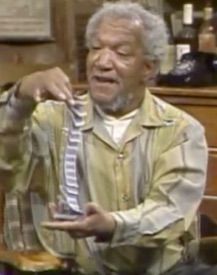
Thus it's no surprise that when Skeeter gives himself an ace when determining who will deal, the flyswatting starts even before the first hand.?? The game they play is five-card draw, and Lamont starts losing right away, including one hand in which Skeeter beats his full house with a straight flush.
"Flush is right," says Fred to Lamont. "Your money's going right down the toilet!"
In the end Fred ends up saving the day by sending Lamont away on an errand and successfully hustling the hustlers �� winning all their money and clothes, too, thanks to a marked deck of cards and some special sunglasses. While counting his winnings, Fred paraphrases the scripture: "Deal unto others as they have dealt unto you."
The episode fits well with other episodes in which the pair engage in various money-making schemes while attempting to better their situation. It illustrates a recurring plot device of the show wherein the son doubts the father's acumen and decision-making abilities, but Fred ultimately proves himself more worldly and wise. It also reinforces the characters' dependence on one another, one of the show's more enduring themes.
There'd be more poker-related episodes in the series. In one from later that second season called "The Kid," Fred plays with a nine-year-old boy from the neighborhood with the youngster winning. Another from late in the fourth season titled "The Stung" (the title playing on the 1973 film) features another poker night and another set of villains against whom Fred and Lamont must scheme.
Cheers answers the question "Why poker?"
The long-running show Cheers set in a Boston bar and featuring an ensemble cast was one of the funniest and best-written shows ever. With the entire run available on Netflix, fans of TV comedy who haven't seen it should do so.
Despite being set in a bar, the show only occasionally featured poker. In a 1987 episode from the fifth season in which bar owner Sam (Ted Danson) and waitress Diane (Shelley Long) are considering buying a house together, some fun is had regarding Sam's love for Cassius M. Coolidge's "Dogs Playing Poker" paintings.
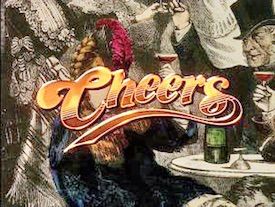
Another from 1992 (Season 10) called "License to Hill" incidentally features the cast playing a poker game as a distraction from a larger plot involving the bar's liquor license being in danger of not being renewed. In that one the character of Woody (Woody Harrelson) earns some laughs thanks to the contrast between his rural background and that of the Bostonians.
Getting to call the game, Woody suggests they play "Five Blind Piglets and One Full Teat." "What the heck is that?" chuckles Norm (George Wendt). "That's where five city boys lose all their money," answers Woody. (He predictably cleans up in the game.)
Back in the first season, a 1983 episode called "Pick a Con... Any Con" featured a complicated plot centered upon the character of the bartender Coach (Nicholas Colasanto), a memorable cast member for the show's three seasons until Colasanto's death.
It's discovered that over the course of several months Coach's (alleged) friend George has hustled him out of eight thousand dollars playing gin. A ruse is set up involving a hustler-friend named Harry (Harry Anderson) who agrees to help Coach get his money back versus George �� a.k.a. known con "Eddie the Mole."
They set up a poker game in order to pull off the ruse. "Why poker?" asks Diane. "Why not crazy eights? Why not chess?" Her questions go unanswered, though it's obvious poker is a much preferred means to get back the money as well as further highlight various characters' traits.
For example, in one hand Norm moves to raise, saying "Lord hates a coward" as he does, and George (or Eddie) responds by suggesting Norm is bluffing. "You're right, I'm out," says Norm, instantly folding �� and confirming his character's general disinclination to leave his comfortable seat at the end of the bar and entertain risk.
The Coach's gullibility �� proven by his having become the Mole's "mark" �� is used by Harry to help set up the successful scheme against George. Indeed, in the end George thinks he and Coach are scheming against Harry, having agreed to do so because Coach "is the last person Harry would figure being in on anything clever."
The poker game not only proved a good way to get back Coach's money, it helped further demonstrate certain characters' traits as well. Furthermore, the game served to forge deeper connections among the main cast members forced to band together against a villainous outsider �� with all being set right (of course) in time for the next episode.
"Making mistakes and not caring" on Married... with Children
On the surface, the show Married... with Children harkened back to the domestic comedies of an earlier era such as discussed last week, although in truth it helped inaugurate a different, almost parodic wave of "dysfunctional family" TV comedies appearing during the late 1980s and after.
At the center was Al Bundy (Ed O'Neill), seemingly doomed to unenviable life as a shoe salesman whose wife Peggy (Katey Sagal) and two children constantly mock and disrespect him.
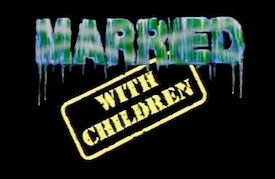
Indeed, throughout the 11-season run of the show all of the Bundy family are often primarily antagonistic with one another. Even so, as some critics pointed out, despite its occasional farcical elements the show could be argued to have offered a more "realistic" depiction of family life than did more idealized older shows like Leave It To Beaver and Father Knows Best.
In 1987, the eighth episode of the first season, titled "The Poker Game," provided another example of how efficiently poker can be used to present characters early in a series.
Like happened in those earlier domestic dramas, poker is shown on Married... with Children as a source of division between men and women generally, and Al and Peggy in particular. When Al informs Peggy of his plans to play that night, Peggy complains.
"Oh gee, Al. That's great. Another night I don't get to go out and do anything. Thank you honey," she says sarcastically.
"Honey, you don't want to go out on Friday night," replies Al, not missing a beat. "Everyone and his wife is out on Friday!"?
During these first few shows, the neighboring couple, Steve (David Garrison) and Marcy (Amanda Bearse), are presented as a contrast to the Bundys �� a loving, mutually supportive couple. But the Bundys gradually influence them, and Steve's accompanying Al to the poker game provides a handy opportunity to illustrate such influence.
The five-card stud game is chauvinistic in an over-the-top way. Only men play (of course), with the table talk primarily focused on women's looks and a collective attempt to envision the "perfect woman" as constructed from various parts of female celebrities of the day. When one player has to leave early to take his wife to the ballet, he predictably earns the unrestrained derision of the others.
Steve can't comfortably engage in such talk, being sympathetic to his wife Marcy's feminist leanings. Nor does he play poker, being too risk-averse to gamble. The idea that Steve lacks the "masculinity" to play is thus unsubtly advanced.
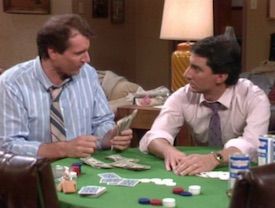
You might guess where this is headed. Steve does eventually join the game after observing the others and deciding he can read everyone else's transparent tells. But things don't go as planned for Steve as he loses $300 �� all of it to Al.
Knowing Marcy will be upset, Steve asks Al for advice. "Steve, you're a man!" says Al. "Lie like a duck."
Steve says he can't lie to Marcy. "Our relationship is based on honesty," he explains. Al only laughs, then shows he has no difficulty at all lying to Peggy when he tells her he lost as poker so as not to have to share his winnings with her.
A distraught Steve continues to consult with Al, whose advice to him underscores what at the time seemed a somewhat outrageous ethos for the father in a "family"-based sitcom:
"That's what being a man is all about, Steve. Making mistakes and not caring."
Here again poker helps the show's creators quickly position the characters for future comic situations, helping establish in this case Steve �� the man sympathetic to women who avoids unnecessary risk and holds other "moral"-seeming views �� as an object of ridicule while also confirming main protagonist Al's general misanthropy.
Conclusion
Next week we'll look at a few more examples of more recent television comedies using poker as a means to present characters early in their series runs.
From the forthcoming "Poker & Pop Culture: Telling the Story of America's Favorite Card Game." Martin Harris teaches a course in "Poker in American Film and Culture" in the American Studies program at UNC-Charlotte.


